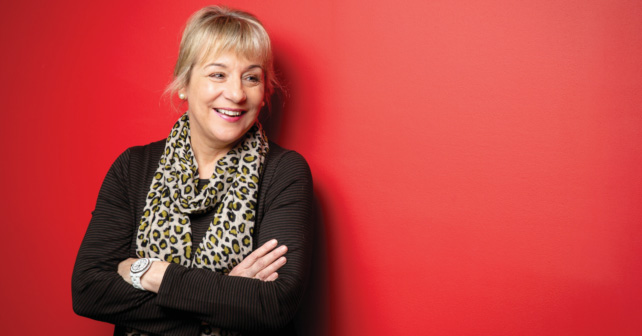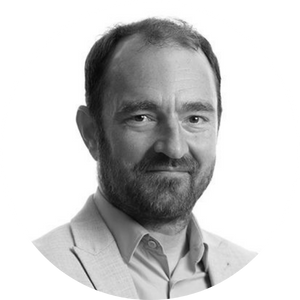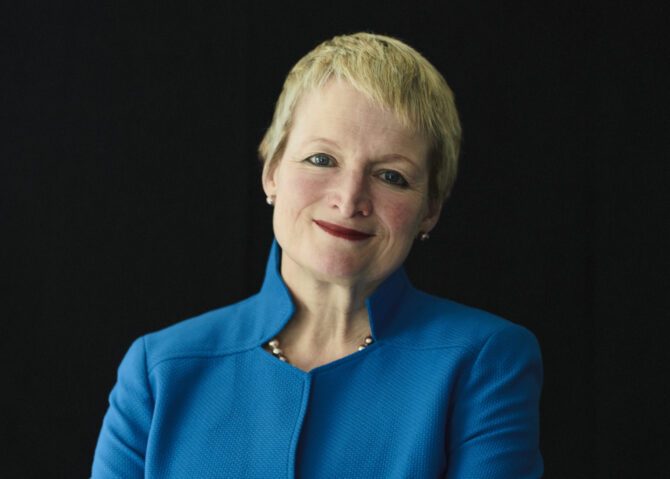Martina Milburn, CEO for The Prince’s Trust for vulnerable youth, believes in following her instincts.
“When you meet the kids in week one of our programme, they won’t talk to you,” says Dame Martina Milburn, chief executive of The Prince’s Trust, the Prince of Wales’ UK charity for vulnerable youngsters. “They won’t even talk to each other. Some of them are there because they have been told by the local police that unless they go on the programme they are going to court. And then we say, ‘next week, you are going on a week’s residential, where you’ll share the cooking, you are going to do coasteering, you are going to do mountain biking’. And they will universally say, ‘absolutely not’ – usually with a lot of expletives added.”
By the end of the programme, in week 12, the same young people have to report on what they liked best: “Inevitably, they will all say that the best bit was the residential. And they will all tell you that the programme wasn’t long enough.”
Milburn is in the business of building confidence. “You can’t do that in a classroom. The only way you can do it is provide those kinds of opportunities. You have got to let them fall off their bike! You have got to let people make mistakes so they can learn and build their confidence. I’ve seen kids in tears at the top of an abseil, and it might take four days to persuade them to do it. But when they do it, you can see that switch; ‘If I can do that, I can do all of the other stuff’. It should be a key part of what we do with our young people.”
Milburn’s passion for making positive changes has led her to the chairmanship of the UK government’s Social Mobility Commission. She has been emphatic about the challenges: social mobility in the UK is among the lowest in the OECD, she says, and has remained flat since it was first measured in a consistent way in 2010. She thinks that those who believe the key to increasing mobility is to encourage more people to go to university, leave their hometowns, seek professional employment, “are looking at the problem the wrong way”, and that local solutions – non-graduate apprenticeships and the like – might offer a better route.
She thinks Britain’s apprenticeship system offers too many places at graduate level and far too few at lower levels, and that entry requirements heavily based on students’ grades in academic school subjects are blocking some good candidates. “All the course leaders tell me that they hire for attitude – so if you got a D and a C in Maths or English, but you are the right person to do it, does it matter?” Her view is controversial. Does she think it will resonate with the government? “Possibly not.” Does she care? “No. I’m there as an independent commissioner and we will pay for the research, look at the evidence, then say what we think the evidence is showing us.”
Milburn began her career as a trainee reporter in the 1970s. Journalism typically breeds scepticism: so how did someone from this most cynical of professions come to work in a field where hope is a vital currency? “Oh, I think that being sceptical is good,” says Milburn. “Particularly in the aid world, you need people who come and say, ‘well, hang on a second, does this add up? Does this look right? Does it feel right?’”
Milburn is a proponent of what might be termed the ‘sniff test’ – her instincts tend to lead her to the evidence, rather than vice versa. After her days as a journalist, she worked at a spinal injury charity in London called Aspire. She found the place “inspiring”, she says, but even great organizations have their problems – and she used a reporter’s sixth sense to identify them. “Leadership is about trusting your instinct,” she says. “I learned quite quickly that when I ignored it, that tended to be when things went wrong. There were things that you started to look at in the charity and you thought just didn’t feel right.” She sniffed out the story, the data backing her gut more often than not. “I would go through it all with the chairman and say, ‘here’s the evidence, this is what I think isn’t quite right,’ and both he and the board were supportive in the changes I wanted to make.”
I suggest that the science is with her: several academics, and writers like Malcolm Gladwell, have suggested instinct is an instantaneous aggregation of experiences. Did she sense that the evidence didn’t support a particular course of action before she was able to prove it? “Yes, I think that’s what you learn,” she says. It’s like interviewing to fill a position, she says: you sometimes know “almost instantly whether you think they are going to fit, and you just spend the rest of the interview confirming your initial views and impressions”.
This rapid learning mechanism, these heuristic shortcuts, were crucial at an organization which, she jokes, comprised “two people and a dog”. Yet the role shaped her. “I said I would do a year and stayed for seven,” she says. “I had to do everything. I was the HR director, technically the chief executive, the PR person, the fundraiser. It was a real baptism of fire and it taught me huge – huge – amounts.”
Milburn says she has been “extraordinarily lucky” in her career, yet it has not all been plain sailing. She is the eldest of five girls from a Catholic family “who grew up with charity as a key part of our lives”, but a job at the Catholic international development charity CAFOD – just after she had the first of her three children – was to prove turbulent. “That was one of my toughest experiences,” she recalls. “They were not keen on my taking maternity leave, because no-one had taken maternity leave before. And, also, as a new mother with a child that didn’t sleep, I was totally unprepared. I ended up handing my notice in after about six months. I couldn’t cope at all, and was not supported in the workplace at that point. The end point at CAFOD was probably the lowest point in my career.” It was an intense ordeal, but short-lived, and she moved on quickly. “But it did make me determined, if I was ever in a senior position in an organization, to make sure we looked at proper flexible maternity leave. I look now, and it’s a year. In those days, you were lucky if you got six weeks.”
The working world, she says, “was very different” when she set out. She was among the first-ever cohort of women entered to a Press Association traineeship. “Before then it was only open to chaps… they decided to employ a girl, and I got the job.” What would now be clear cases for disciplinary action were commonplace and acceptable, she says. Did she encounter prejudice? “It depends how you define prejudice, doesn’t it? If you were a young woman in the workplace, nowadays it would be called sexual harassment. But there was a lot of it and – I am absolutely not saying it was right – you just put up with it. And on the whole when you said, ‘no’, it was fine. There was a lot of banter and – probably – getting your bottom smacked by the photocopier, and nobody thought that was unusual. You just made sure you went to the photocopier when nobody else was around. It was just different. I am really not saying it was right. You put up with all that, but I don’t remember prejudice in the sense that they said, ‘you can’t do this because you are a girl’.”
Milburn makes a habit of playing down adversity and focusing on the positives. Yet tackling 1970s social attitudes, running charities virtually singlehandedly, and raising a big family while trying to earn a living, all undoubtedly helped prepare her for life at the top of a sector which can be haphazard, demanding and fraught with risk.
At The Prince’s Trust, she works with vulnerable people aged 11-30, to bring their lives back on track. The nature of the work means that success is uneven; the very best projects can fail. I put it to her that some – perhaps many – of the Trust’s programmes wouldn’t ever see the light of day, were they assessed for risk in the private sector. “I don’t think you can look at it like that,” she says. “If you did, you probably wouldn’t do anything. People, just by their nature – and teenagers even more – are inherently risky. When you add that to all the social facts, they are even more risky. We have always had the view, and even from the Prince of Wales, that if things don’t go wrong, we are probably working with the wrong group of young people. You just accept, right from the beginning, that what you do is a risk. It just comes with the territory.” She is clear that those young people’s needs come first. “You have to start with the young person, work out what works for them, and then find the funding that fits – even if that means you will be a smaller organization for a longer period of time.”
A determination to keep refreshing organizational structures has been evident throughout her career. Before she came to work for Prince Charles, she landed the chief executive role at Children in Need, a charity wholly owned by the BBC. When she arrived there in 2000, she found it failing. “It didn’t have a high profile within the BBC,” Milburn recalls. “I gathered my evidence, sat down with the chairman and said, ‘the BBC needs to make a decision, do they want to support this? In which case, they need to give it more resources and a different profile. Or, do they want me to close it?’” Income had gone down, as had viewing figures. “Luckily for me he said, ‘yes, you are right, I think we should invest’.” By the time of her departure to The Prince’s Trust four years later, the charity had been reinvigorated. BBC governor Sir Robert Smith commented on her remarkable success and increased public support.
What’s her secret? How does she deal with board members whom she considers misplaced or misguided? “Assuming one of those people isn’t your chairman, the first thing you do is talk it through with them. Then it’s very important to find a way where everybody saves face. Allow people their dignity. When people are giving their voluntary time and their passion, you need to acknowledge that. And that’s why I think tenures on boards are so good, because at the end of them you can say, ‘we need to look for a new skillset’, and generally people accept that.”
How does she channel the zeal of the newcomer? At The Prince’s Trust, like everywhere, there were challenges. “I didn’t take any notice of the ones who didn’t want any change; and I didn’t take any notice of the ones that wanted change immediately,” she says. “I just did it in what I felt was the right time, and delivered it.” What amount of thinking time is enough? “You can’t leave it two years. For me, it was four to six months, but there was quite a lot to be fixed, so it took quite a long time!”
In 1999, five charities had been merged to form the Trust, but it was a merger in name only. The predecessor bodies continued to operate quasi-independently. The senior management team was 22-strong. “They had merged them, but they hadn’t integrated them.” Several governance problems bubbled up – she had to bring many volunteer boards under direct control to ensure compliance with stringent new regulations. Several trustees weren’t happy with her appointment. “And, when they heard about the things I was going to change, they felt even more uncomfortable. At least two of them wrote to the Prince. What they don’t know is that I got to see all the letters! But you don’t take any of this stuff personally. You have to decide what you think is right for the organization because, if it all goes wrong, it’s your shoulders that it all falls on.” And nobody remembers the other stuff? “Nobody remembers the other stuff!”
She has refocused the Trust on helping the long-term unemployed, increasing the proportion of vulnerable young people it successfully gets into work or training. She emphasizes the power of people ensuring that endures. “In terms of the young people’s follow-on journey,” she says, “mentoring is enormous. A lot of young people stay in touch with their mentors long after the official relationship has finished.”
Milburn pulls people together. She’s at the top of her field now, but her personal credo has remained with her since her days as a cub reporter. “Journalism gives you the ability to talk to people,” she says. “Because if you can’t talk to people and you don’t get on with people, then you are never going to get any stories. That curiosity for finding out about stuff is really great. I think that’s a hugely transferable skill.” Through exploration and connection, Dame Martina Jane Milburn tells her own story by changing the lives of others.
– An adapted version of this article appeared on the Dialogue Review website.




